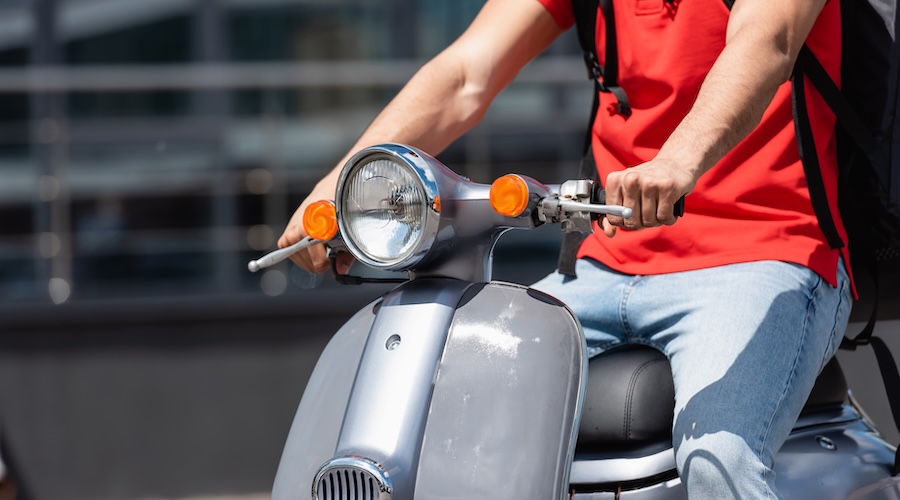Understanding Virginia moped laws is vital to your safety and can help you avoid violations that lead to fines. Moped drivers in Virginia should:
- Verify that their vehicle fits the legal definition of a moped
- Register your moped
- Wear protective gear
- Follow all riding restrictions
Virginia defines a moped as having less than four wheels, a seat no less than 24 inches high, and an engine displacement of 50 cubic centimeters or less. The law also stipulates driving at 35 mph or less. If your vehicle has a bigger engine or you go over 35 mph, you are subject to Virginia’s motorcycle laws.
If you get in an accident that was someone else’s fault, contact an experienced moped accident attorney to help you seek compensation.
Do You Need a License To Drive a Moped in Virginia?
You do not need a driver’s license to operate a moped in Virginia, but you must be at least 16 years old and carry a government-issued photo ID. If you have a driver’s license and it is suspended or revoked for certain alcohol-related offenses, it is illegal to drive a moped until you complete all court and Department of Motor Vehicles (DMV) requirements.
These offenses include:
- Driving under the influence
- Underage alcohol consumption
- Refusing a blood or breath test
- Driving with a license that is revoked or suspended for a DUI-related offense
Virginia’s driving while intoxicated laws for adults and minors apply to driving mopeds. People who violate these laws face severe penalties, including mandatory jail time and even vehicle seizure in some cases.
Moped Registration and Titling Requirements
Moped laws in Virginia require you to register your moped before driving it and pay DMV fees. Currently, a moped title in Virginia costs $15, and you must pay $18.25 annually to register your moped. You receive one license plate, which you must place on the back of the vehicle.
When you apply for a title, you must fill out the DMV’s Moped Certification Form, indicating how you intend to operate the vehicle.
Do You Need Insurance for a Moped in Virginia?
Virginia does not require that you carry vehicle insurance for your moped, but not carrying any could be a mistake. You are liable for the accidents you cause when driving a moped, including hitting other vehicles, pedestrians, and cyclists. Without insurance, you risk personal liability for the injured party’s damages.
If you drive your moped for a delivery service, you may be required to carry insurance. A dealer may also require collision or comprehensive coverage if you lease your moped.
Safety Gear Requirements for Moped Riders
Virginia requires safety equipment when riding mopeds. All riders and passengers on mopeds must wear helmets that meet the standards of Virginia motorcycle helmet laws. If your moped doesn’t have a windshield, you must wear eye protection, such as goggles or a face shield.
Where Can You Ride a Moped in Virginia?
Mopeds are not allowed on interstates in Virginia, and you cannot ride your moped on a sidewalk or bicycle lane. On other roads, mopeds must use the right-most lane or shoulder. There are exceptions, such as making a left turn, avoiding objects, or passing a vehicle moving in the same direction.
Check local ordinances to determine if there are additional rules regarding where you can legally operate a moped. Some cities and universities further regulate their use.
Are Mopeds Allowed to Lane Split in Virginia?
Moped riders must follow the same traffic laws as other drivers, such as obeying signals and following right-of-way rules. Virginia bars lane-splitting or riding between two lanes of traffic heading in the same direction on a moped.
Moped drivers can pass other vehicles in the same lane on the left or right side, but only under conditions where they can do so safely.
Moped Parking Laws in Virginia
It’s important to know the moped parking laws where you live or travel, such as Norfolk parking violation fees and Virginia Beach parking laws. Parking laws that apply to other vehicles also apply to mopeds.
You cannot park a moped on the sidewalk within 15 feet of a hydrant or 20 feet of intersection curb lines. You must park it in designated motorcycle spaces or other legal parking spots. Municipalities often have additional parking rules, and the penalties for unlawful parking vary.
Penalties for Violating Virginia Moped Laws
There are penalties for violating Virginia’s moped laws, including:
- Operating an unregistered moped: Class 4 misdemeanor with a penalty of up to $250
- Not wearing required safety gear. Traffic infraction with a fine of not more than $50
- Riding in restricted areas (such as interstates): Traffic infraction with a fine of $50 or less
Legal penalties aside, moped laws protect drivers and passengers. You risk severe injury if you don’t wear protective gear and follow Virginia’s moped and other traffic laws.
What To Do After a Moped Accident in Virginia
After a moped accident, gather evidence, such as photos, videos, and witness contact information. Keep this in a file with your medical records and other documents related to your crash. If you have moped insurance, notify your insurer of your accident.
Contact an experienced Virginia Beach personal injury attorney to discuss your options for seeking compensation. If the other driver was at fault, you can make a claim against their insurance policy or, in some cases, file a lawsuit.
At Cooper Hurley Injury Lawyers, we have significant experience determining liability in moped and other motor vehicle accident cases.
Get Legal Help for Moped Accidents in Virginia
If you need help with a moped accident, motorcycle crash, auto accident claim, or legal advice on traffic violations, contact the experienced legal team at Cooper Hurley Injury Lawyers. We have over 120 years of combined experience and have recovered millions in verdicts and settlements for our deserving clients.
Call us for a free case evaluation today at (757) 333-3333, or complete our online contact form.



